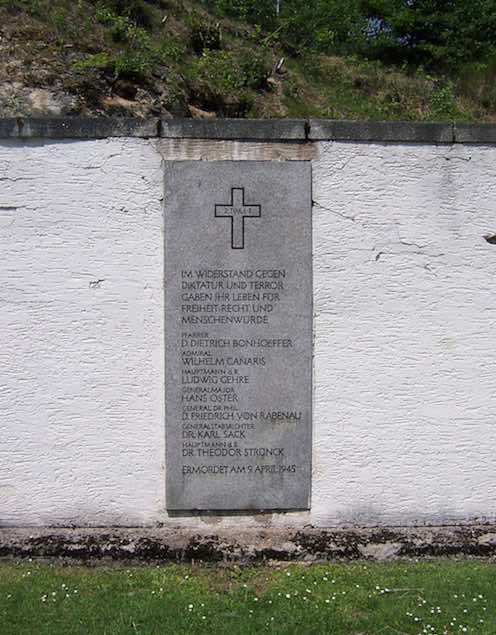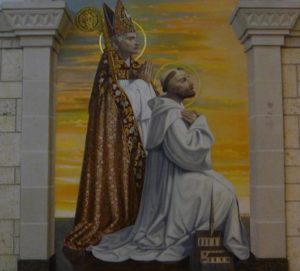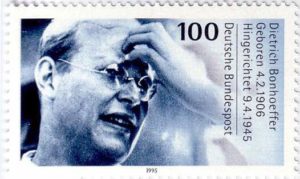Letters and Papers from Prison
Letters and Papers from Prison, from Dietrich Bonhoeffer was published in English by Augsburg Fortress (DBWE 8) Minneapolis in 2010.
The original German edition Widerstand und Ergebung was first published in 1951 by Kaiser Verlag München.
The book was composed by Eberhardt Bethge, his friend and biographer, from letters written by Bonhoeffer in Tegel Prison in Berlin.
Dietrich Bonhoeffer, a German pastor, resistant to Nazism
Dietrich Bonhoeffer (4th February 1906-9th April 1945) was a German Lutheran theologian and pastor of the Confessing Church. This Church denies any link between Christianity and Nazism. Upon the seizure of power by Hitler, he took a stand against this political regime, because of the exclusion orders prohibiting Jews any job in the administration.
In 1938, he secretly joined the resistance network of Admiral Wilhelm Canaris, who then was head of the departement of counter-intelligence of the German army. Officially Dietrich Bonhoeffer was a counter-intelligence agent and he travelled to Switzerland and Sweden to inform the Allies about the existing opposition against Hitler, but without success.
Arrested in April 1943 under the pretext of wanting to escape the armed service through his travelling, Bonhoeffer was imprisoned in Berlin Tegel until October 1944. He could have been released if his trial had taken place early.
After the failure of the attack on 20th July 1944 against Hitler, secret documents are discovered in the counter-intelligence archives of Canaris opposing the regime, with the names of participants, including Canaris and Bonhoeffer.
He was transferred to a Gestapo prison and deported to various concentration camps. He was put to death on April 9, 1945 at Camp Flossenbürg in Bavaria, with members of the Canaris network.
Letters and Papers from Prison will be seen in a thematic approach in three areas: 1. suffering and dignity of a prisoner, 2. restricted but effective life in common 3. philosophical and theological reflections of a Christian who is lucid about his time and man’s relationship with God. Some comparative references will be made to Ethics and Life Together
Suffering and dignity of a political prisoner
Imprisoned on April 5, 1943 at Tegel, Dietrich Bonhoeffer organizes his life in a cell. He tries to maintain his mental balance with a detailed daily timetable in the letter of October 13, 1943. He probably applies then the model and principles of “the day of a believer” in Life Together.
If Christians can live in a community already visible on earth, it is only in anticipation of the Kingdom to come. The prisoners, the sick, the isolated in the dispersion, missionary preachers, all are alone. However, they seize by faith what is denied to them as experience. .. Life among Christians is a gift of God’s kingdom that can be taken away every day, and we can from one moment to another be precipitated in total seclusion.
Adaptation to loneliness through meditation and prayer
He fits to his enforced solitude: By refusing to be alone, you reject the call that Christ has personally addressed to you. He accepts his fate: We have no choice but to wait patiently and without embittering, hoping that all are doing what they can to clarify the situation as soon as possible.
Thus, by daily meditation .. .and personal prayer, recollection. . . he managed to have the word of God penetrating so deeply in the heart of the believer that it can support and strengthen him all day long : he reads and meditates his Bible, he recites for himself the songs of Paul Gerhardt, a German hymn writer of the 17th century.
Gratitude for the little pleasures
Once he has the right to write, he reassures his parents: he has his Bible, given back after three days, newspapers … library books, writing paper. He speaks of his readings: Stifter whose sympathetic characters have a beneficial influence. He remembers fondly the happy past: summer evenings, family celebrations … ; he is grateful for a day … that brings letters.
It is a strange sensation to depend absolutely. .. on the help of others. But such a situation teaches you to be grateful. . . Only gratitude enriches life.
Difficulties of uncertainty
But isolation as a prisoner and especially the uncertainty about his future are more painful than he is willing to admit. Dietrich Bonhoeffer attributes his impatience with delays and postponements of his trial to the desire to organize his life:
I would prefer that they tell us immediately the likely duration of the detention, I would have been able to develop my work quite differently and make it more fruitful,
but he regrets it almost immediately :
Rereading this letter, I note that the tone is unhappy. It was not my intention and it does not correspond to reality. As much as I want to get out of here, so I know that none of these days is lost.
Between the alternatively hot and cold shower (It seems that my situation will change, and I am very happy) and the disappointment due to procrastination :
The fact that they want to let me spend Christmas here, goes beyond my understanding, ; when they ensure you precisely that your case will be closed in July 1943 and then in September 1943 as absolute deadline, and the months pass and nothing does happen … one finally falls, despite all the efforts of patience and understanding, in a state where it is better not to write letters.
He expresses his gratitude for family education which prepared him for such circumstances. It is only in such moments that we discover the price of a past and an inner heritage which are independent of the changing times and circumstances.
He refuses pity from others and from himself:
I feel within me a strong resistance when reading in some letters allusions to my suffering. “. One has no right to dramatize things. Many aspects of life here are abominable, of course; but where is it not the case ?
Nostalgia
Nevertheless, on May 15, 1943 his suppressed nostalgia bursts out ;
suddenly, the peace and quietness are shaken, – “like a bursting in of evil powers ” and then the heart becomes an obstinate and despondent thing we cannot sound out.
What he lacks, in the icy atmosphere of the captivity, is the warmth that comes from the affection of a woman and of a family.
Engaged to Maria von Wedemeyer, just before his arrest, he mentions her visits with a discreet M.
Then he apologizes to his friend, with great restraint, for having written some poetry … all … in a few hours and not reshaped … I possibly will repress such outbursts in the future and spend my time more usefully “. In his poem ” The past “, composed after brief visits followed by a long separation, he lets passionate feelings explode that have never been able to express themselves freely.
You went away, enjoyed happiness and dearly loved pain.
How shall I call you ? Distress, life, happiness,
Part of myself, my heart – my past?
The door closed.
I hear your footsteps move away and vanish slowly.
What is left to me? Joy, torment, desire?
All I know: you went away – and everything is over….
Deep distress
It was also to his friend that he trusts the deep distress of his actual situation :
Despite all that I have written, it’s horrible here; … Atrocious impressions hound me … I recover only by reciting countless verses of hymns … and the day begins with a sigh rather than a praise to God ….. I feel I have aged several years in response to what I see and hear; the world becomes a burden I am often disgusted of.
He further describes it in the report of the first days of his detention. A cell with stinking blankets … A piece of bread thrown to the ground … Insults and mockery, neither correspondence, nor visits, nor walks …
Has he been tempted by the idea of suicide? Perhaps he mentions it in the first letter to Eberhard Bethge :
I was safeguarded during those days from any serious temptation. Acedia – tristitia (bitter sadness), with its ominous consequences, often set a trap for me.
But he was determined to dismiss it.
From the beginning, I told myself that I will please neither to men nor to the devil; they may themselves see to it, if they wish; I hope to hold on, not to ask questions without answers, if it really is for the cause of Christ. It is certain that his mission is precisely to accept an… ambiguous situation.
Accepted choices
There will be no further allusion to it thereafter. Rather, he completely takes his choices upon himself:
The cause for which I would be condemned is so indisputable that I only could be proud of it. I want you to know that I have never regretted a single moment my return in 1939 or anything of what happened next. I acted in complete serenity and in good faith …. That I am now arrested is in full participation to the fate of Germany.
To be continued
C. Streng



